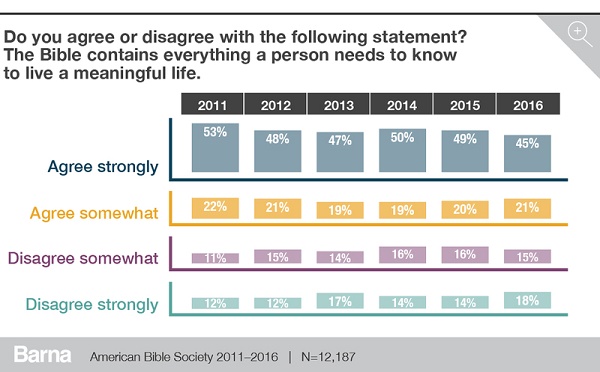
Tracking the Trends of the Bible in America
- By Derek Welch --
- 09 Jul 2016 --

Barna releases a study on Bible trends in the United States.
The Barna Group have released the results of their latest poll of the American public with regards to the Bible and the results will be worrying for many Christian groups.
Tracking the Trends of the Bible in America[/tweetthis]
Barna carries out a range of surveys regularly, to keep track of religious trends. In the past few decades, these results have largely stayed the same across each survey -for instance, the number of American adults who reported reading the Bible once a week was 45 percent in 1991, and 46 percent in 2009. However, in 2016 that figure has dropped to only around 33 percent, with only 24 percent of millennials doing so.
The Bible is still the most popular choice when Americans are asked to identify which books they consider holy, but there has been a significant drop in that figure since 2011, from 86 percent to 80 percent. By contrast, the number of people who identify their religion as “none” has doubled in the same amount of time, up from 7 percent to 14 percent. Again, this was largely down to the younger generations, who are several times more likely to hold this opinion than Baby Boomers.
Similar trends can be seen in the answers to two more questions: whether they agreed with the statements “the Bible is totally accurate in all the principles it teaches”, and “the Bible contains everything a person needs to know to live a meaningful life”. For the former, those answering “strongly agree” has dropped 15 percent to 33 percent, whereas “strongly disagree” almost doubled, up 11 percent to 23 percent. The latter question saw lesser changes, but followed the same general trend- “strongly agree” dropped 8 percent to 45 percent, while “strongly disagree” rose 6 percent to 18 percent.

Even though it's USA stats it still makes for interesting UK reading -The Bible in America: 6-Year Trends https://t.co/6AonZM89vU
— Toby Skipper (@tobyskipper) June 23, 2016
However, it’s not all bad news for staunch followers of the Bible. Those believing the Bible contains no errors whatsoever are still in the majority, although split on whether or not it may sometimes be symbolic rather than literal, and whether it is the actual word of God. What’s more, all of the above questions still find believers firmly in the majority, even though they may be less stringent in their beliefs than they once were.



















